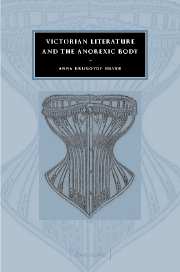Book contents
- Frontmatter
- Contents
- Acknowledgments
- Introduction
- 1 Waisted women: reading Victorian slenderness
- 2 Appetite in Victorian children's literature
- 3 Hunger and repression in Shirley and Villette
- 4 Vampirism and the anorexic paradigm
- 5 Christina Rossetti's sacred hunger
- Conclusion: the politics of thinness
- Notes
- Bibliography
- Index
- CAMBRIDGE STUDIES IN NINETEENTH-CENTURY LITERATURE AND CULTURE
4 - Vampirism and the anorexic paradigm
Published online by Cambridge University Press: 22 September 2009
- Frontmatter
- Contents
- Acknowledgments
- Introduction
- 1 Waisted women: reading Victorian slenderness
- 2 Appetite in Victorian children's literature
- 3 Hunger and repression in Shirley and Villette
- 4 Vampirism and the anorexic paradigm
- 5 Christina Rossetti's sacred hunger
- Conclusion: the politics of thinness
- Notes
- Bibliography
- Index
- CAMBRIDGE STUDIES IN NINETEENTH-CENTURY LITERATURE AND CULTURE
Summary
While visiting her old lover Mr. Holbrook, Miss Matty Jenkyns, the heroine of Elizabeth Gaskell's Cranford (1851–1853), faces the problem of how to eat a plate of new peas without the proper silverware. Describing this dilemma, Mary Smith notes that: “Miss Matty picked up her peas, one by one, on the point of the prongs, much as Aminé ate her grains of rice after her previous feast with the Ghoul.” Gaskell alludes to a tale in the Arabian Nights in which Sidi Nouman discovers that his wife Aminé, who eats only a few grains of rice with a pin for dinner, is really an enchantress who clandestinely devours the flesh of corpses; the apparently delicate woman without an appetite turns out to be a monster who gorges upon gruesome and forbidden food at night. An allusion to Aminé also appears in Thackeray's The History of Pendennis, in which the narrator describes Blanche Amory's deceptive eating habits: “When nobody was near, our little syphide, who scarcely ate at dinner more than the six grains of rice of Amina, the friend of the Ghouls in the Arabian Nights, was most active with her knife and fork, and consumed a very substantial portion of mutton cutlets.” In Blanche's case, the split between her private and public dining indicates her general untrustworthiness and falseness, while the comparison of Miss Matty with Aminé is more clearly ironic, its humor relying on the obvious gulf between the two women, one malevolent, the other gentle and completely unthreatening.
- Type
- Chapter
- Information
- Victorian Literature and the Anorexic Body , pp. 116 - 135Publisher: Cambridge University PressPrint publication year: 2002



